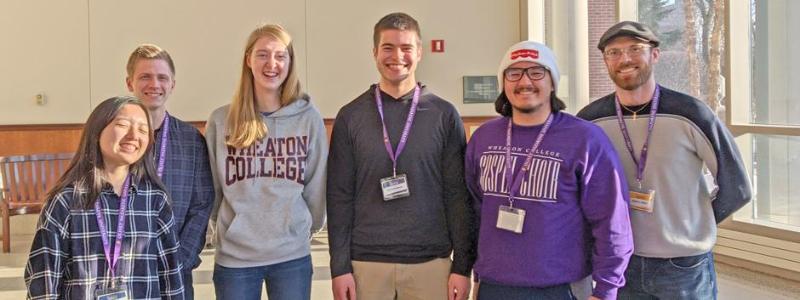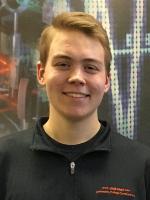
Computer Science Majors Sweep Coding Competition
On Saturday, Feb. 26, 2022, two teams of computer science majors from Wheaton College participated in the ACCA regional programming competition in Bourbonnais, IL. This event has two divisions: Novice, for teams of students with up to three semesters of computer science study, and Advanced, open to all students regardless of experience. Wheaton sent one team in each division, coached by faculty member Dr. Devin Pohly.
Wheaton's Novice team, named "Duck Overflow," consisted of Gloria Kim ('24) and Isaiah Cochran ('24) . Gloria and Isaiah completed three challenging programming problems in the allotted time, more than any other team in their division to secure a first-place finish!
"The Microchipmunks," Wheaton's team of Grace Hunter ('24), Joshua Price ('23), and Brendan Keefer ('22), worked together to solve four problems, clinching a clear first in the Advanced division to complete the Wheaton sweep of this year's contest.
Congratulations to our students for representing the Wheaton College computer science program well with their commanding performance at ACCA!
McKay Receives National Award

Stephen has a naturally curious and inquisitive mind. Over the course of the past two years, he has developed a mature understanding of the interplay between theoretical mathematics and experimental science. He makes insightful connections between theory and practice, exhibiting an excellent grasp of the overall role of theoretical mathematics in the progress of physics. His excellence in the classroom, quality of analytical reasoning, skill in the lab, and service as a Diakonoi coordinator all contribute to this recognition.
Congratulations, Stephen!
More Information on Stephen McKay
Majors in Physics and Mathematics. Did research with Dr. Darren Craig this past summer.
Career Goal
Ph.D. in high-energy physics or cosmology and astrophysics. I aspire to lead research at a national lab, NASA, or a university that studies the nature of black holes, dark matter, and dark energy.
Further Description of Career Goals
After graduation, I will pursue a Ph.D. in physics, likely in high-energy physics or cosmology/astrophysics. I am most excited by research in these fields since they home in on the fundamental nature of the universe we inhabit, the deepest questions of what constitutes reality. Later, I hope to lead a research group studying the makeup of the universe through research at one of the national labs, an international research center such as CERN, or through a position at NASA. I am especially captivated by the question of the identity of dark energy and dark matter, which ties together the large scale structure of the universe with the possibility of new particles in the Standard Model, the smallest known scales of reality. Although the prospect of refining and expanding our knowledge of the world is itself exciting, I am also hopeful that this kind of fundamental research will lead to advances that benefit human life as well, as has been the case with so many other scientific discoveries, regardless of whether they had any foreseen application.
Currently, I am finishing up a double major in physics and mathematics at Wheaton College, taking as many elective courses in each field as I can. To my delight I have found that each math course I complete enhances and illuminates the physics I am learning. This STEM-laden course load has proved to be very valuable already, preparing me for a summer research program in which I studied laboratory plasmas embedded in a magnetic arcade under the supervision of Dr. Darren Craig at Wheaton College. This project taught me new physics concepts, stretched my problem-solving and experimental lab skills, and gave me an opportunity to dive into the professional side of the scientific process. In fact, inspired by this galvanizing experience, I am applying to additional REU programs at Rutgers, Harvard, Boston University, and MIT’s Haystack Observatory for the coming summer. I anticipate that the technical and professional skills I gain from undergraduate research projects will prove to be excellent preparation for a future research career.

